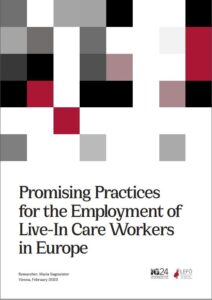Domestic care in Austria is characterized by the lack of protection under labor law and the lack of integration of migrant caregivers into the social system. Caregivers are often confronted with excessive working hours and night work, heavy physical labor and poor pay, which lead to an enormous burden in the industry. For caregivers who work as entrepreneurs, there is no way to report poor working conditions to a supervisory authority. If they are unable to work due to illness or accident, their remuneration is not paid, as they are registered as entrepreneurs and therefore have no entitlements. In old age, they are affected by old-age poverty due to their low pension entitlements. These structurally created vulnerabilities provide a breeding ground for labor exploitation and, in drastic cases, human trafficking.
Based on the current work situation of caregivers in Austria, we took a look at “promising practices” in relation to domestic care abroad as part of the Care4Care project in order to draw conclusions for Austria from best practice examples. Lawyer and researcher Maria Sagmeister examined the legal regulation of employment relationships in home care in Switzerland, Italy and Spain.
In addition, two cooperatives from the UK and Ireland were included in the study for their innovative approaches to the organization of home care.
The study on “promising practices” provides insights into different regulatory systems and offers a basis for the development of an employment model in Austria that ensures fair working conditions and high-quality care.

